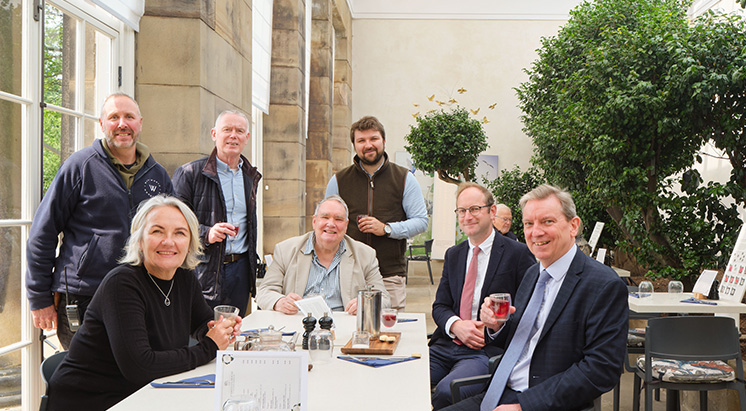Historic Camellia House wins major European heritage award
Europe’s most prestigious cultural heritage awards has given a major accolade to Rotherham country house Wentworth Woodhouse’s restored Grade II* listed Camellia House, which is home to some of the oldest surviving camellias in the Western world.
The European Heritage Awards/ Europa Nostra Awards has declared the project as one of its 30 outstanding winners from 24 countries across the Continent.
The Camellia House was the only project in the UK and one of only three winners outside of the EU Creative Europe Programme, which co-funds the awards.
The building had been derelict for 50 years before a sympathetic refurbishment by heritage architects Donald Insall Associates transformed it from a roofless ruin on the Heritage At Risk register to a public tearoom and heritage venue in 2024.
Its nationally important camellia collection, described by horticulturists as a “library full of first editions”, was carefully tended throughout the construction process.
Europa Nostra is the most representative heritage civil society network in Europe. The awards identify and promote best practice in the conservation and enhancement of cultural heritage, stimulate an exchange of knowledge throughout Europe and increase public appreciation of Europe’s cultural heritage.
The Awards Jury, composed of 11 heritage experts from across Europe, said: “This restoration project removed The Camellia House from the Heritage At Risk register. The revival of a rare camellia collection and the integration of energy-efficient features demonstrate a balanced approach to horticultural, architectural and environmental heritage.
“By restoring cultural and social functions in an area affected by economic hardship, it contributes to regional regeneration through heritage.”
Grade I listed Wentworth Woodhouse, built for the Marquesses of Rockingham in the 18th Century, sits in South Yorkshire, an area of social and economic deprivation.
The entire site was in a state of decay when it was bought by Wentworth Woodhouse Preservation Trust in 2017 for £7m.
The Camellia House in its gardens is a historically significant building. Its north side dates from 1738 and was built as a tea room for Lady Rockingham, wife of the 1st Marquess.
It features an early 19th century orangery to the south, added to house the family’s growing collection of camellias which had recently begun to arrive from China. The rarity and age of the camellias which remain was only recently discovered.
The £5m restoration was funded by The National Lottery Heritage Fund, Historic England and other contributors.
The Preservation Trust’s brief for conservation architects Donald Insall Associates was to sympathetically repair the derelict Georgian building and incorporate sustainability and energy efficiency, all while protecting the historic camellias and ensuring they continue to thrive in their newly-renovated setting.
Traditional craftsmanship and heritage conservation methods were integrated with low-carbon upgrades: breathable insulation, a rainwater harvesting system, and underfloor heating powered by a ground-source heat pump. The project has been described as setting “a new benchmark for the standards of sustainable design which can be incorporated into heritage and listed buildings.”
Applications to this year's European Heritage Awards/ Europa Nostra Awards came from 41 European countries.
The winners will be celebrated at the European Heritage Awards Ceremony 2025 on 13 October during the European Cultural Heritage Summit 2025, which will take place from 12-14 October in Brussels.
The Trust’s CEO, Sarah McLeod OBE, said: “We are bursting with pride to be heading to Brussels to receive this highly-respected European heritage award.
“An exceptional conservation team collaborated to take our Camellia House from a roofless wreck in danger of collapsing, back to its original grace and beauty - and vastly improved its sustainability and green credentials.
“The building, and the historically-important camellias which inhabit it, now have a long and lasting future. The Camellia House is now a thriving cafe and boosting income for the Trust.”
Dorian Proudfoot, Chief Executive of Donald Insall Associates, said: “Conservation is only successful if it enables a building or place's continued use and vitality. The story of the Camellia House, an important part of a wider transformation at Wentworth Woodhouse, is an example of long-term custodianship that not only revived what was an abandoned ruin, but was also a catalyst for lasting social impact.
“It is incredibly rewarding to see our client's vision to create an inclusive, world-class destination being recognised in Europe's most prestigious heritage award.”
Pictured: (from left) Head Gardener Scott Jamieson, WWPT CEO Sarah McLeod OBE and Trustees John Caldwell and Andrew Shepherd, Donald Insall Associates’ Daniel Elkington and its Chief Executive Dorian Proudfoot ,WWPT's Project Manager David Trevis-Smith. Image: Simon Kennedy












